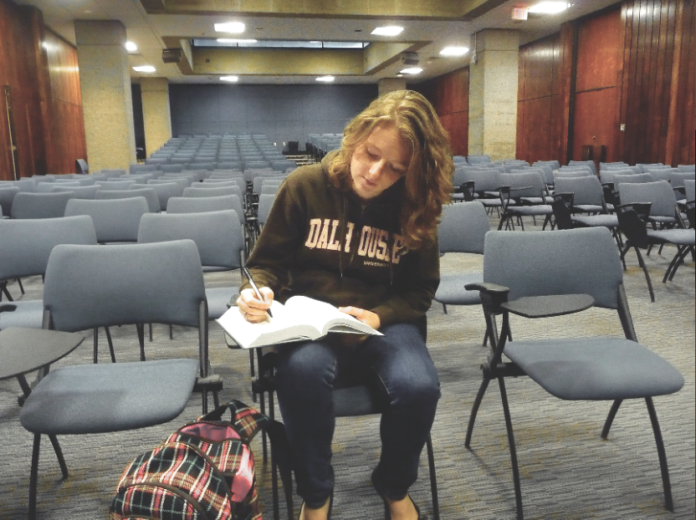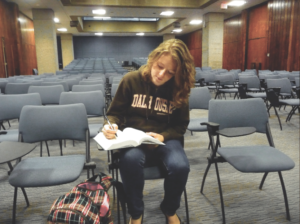And the restlessness that awaits
It’s almost midnight on a Thursday evening. A young woman in the library is poring over her books— marking them up, spitballing ideas then scratching them out. The bags under her eyes turn darker by the hour and she takes swig after swig of coffee to keep her eyelids open.
After a summer of anticipation following her graduation from Dal, Sarah Belong is starting over again, beginning another chapter in her life. At the moment, the thought of another three years is a bit surreal.
The library begins to close up and the few remaining people finally pack up their books to go home. “If I’m still not done, I’ll go home and sit at my desk with my case studies,” says Belong, counting the remaining pages in her law book.
She says she spends up to 15 hours a week at the library. As an undergraduate, she would spend, “15 hours a month. Maybe.”
Belong is entering her fifth year at Dal, and her first year at the Schulich School of Law.
Over the past five years, she completed a combined honours degree in chemistry and English, lived in three different residences and an apartment, and over the past five years, she’s taken a new perspective on student life.
“There’s more of a focus on work hard, play hard,” she says. But Belong isn’t oblivious to the consequences of spending another three years in school.
“When you spend [this] long in school, you still need to establish yourself in the real world,” she says.
Belong notes it could potentially be another eight years before she’s a practicing lawyer, meaning it could postpone other priorities, such as getting married or starting a family.
“But I’d rather have a well paying, secure job,” she says.
Mark Hobbs is another student who has stayed past the fourth year. But for him, it seemed like the most economical choice.
“After the initial four years, a lot of people are gone. You need to make new friends. School becomes more business; you’re there to get something done.”
Hobbs, who arrived at Dalhousie in 2004, extended his stay after stints with the DSU and his own business, Denote Communications. The time and energy dedicated to his work meant less attention on academics.
“I’ve had some extraordinary opportunities. I knew I had to get a degree, but nobody could tell me not to pursue these international business opportunities. It gave me a full-time salary, and my family and mentors couldn’t say no to that.”
While many students rack up a tab on tuition, rent and living expenses, through work and entrepreneurship, Hobbs helped offset the costs incurred by extending his education.
“Paying the extra living expenses and the cost of rent, those are the real costs,” he says.
Like Belong, Hobbs too has changed his perspective on life as a student since coming to Dalhousie.
When he was in first year, he would pass a course “by going to three classes.” In his upper years, you’d be hard pressed not to see him sitting front and centre in every lecture.
Hobbs describes the raw realities of prolonging his stay at university—most notably the lack of common experiences with friends and younger colleagues.
“By the time you’re my age you’re supposed to be finished,” he says.
Hobbs pointed out just how different some of his experiences were compared to his freshmen counterparts, especially in the classroom.
“During our oral exam, this 18 year-old stoner kid who knew a lot of French got his oral exam pushed back, and then he still missed it. He showed up the next day, and the prof still let him do it so he wouldn’t fail the course.”
When you’re younger you have other priorities, says Hobbs.
“When I was 18, I acted like an irresponsible 18-year-old. But you remember where younger students are coming from. You also notice the Dome doesn’t appeal to you the same way it used to.”
Hobbs feels he missed out on some life experiences with certain friends by extending his education.
“I have friends who have gone into the world and done extraordinary things. I have friends who have had children, and if I think about it, some have gotten married too.”
But is staying behind something to despair? Hobbs views it as another opportunity.
“I chose to look at it positively because of all the additional experiences I’ve gained. I’ve made friends, I’ve made my resume competitive, and I’ve made some money.”
When posed with the question of whether or not he’s ready for a change of scenery, Hobbs replied, “I’m ready to leave [Dal]. After this long, most seniors are.”
As for Belong, who is looking ahead to another three years at the Schulich School of Law, she feels her campus years are in their prime.
“I’m not envious of going into the real world. I love school. I could stay here forever.”



Recent Comments